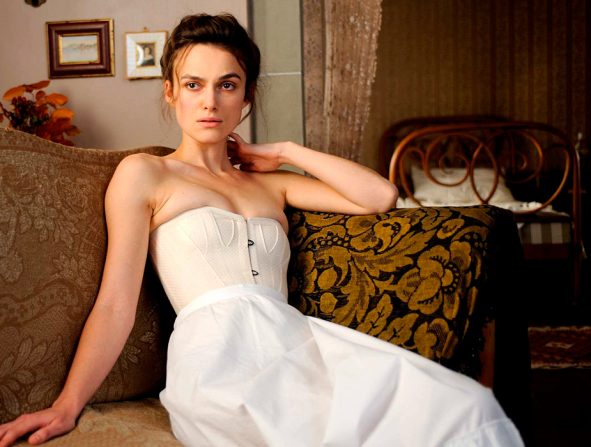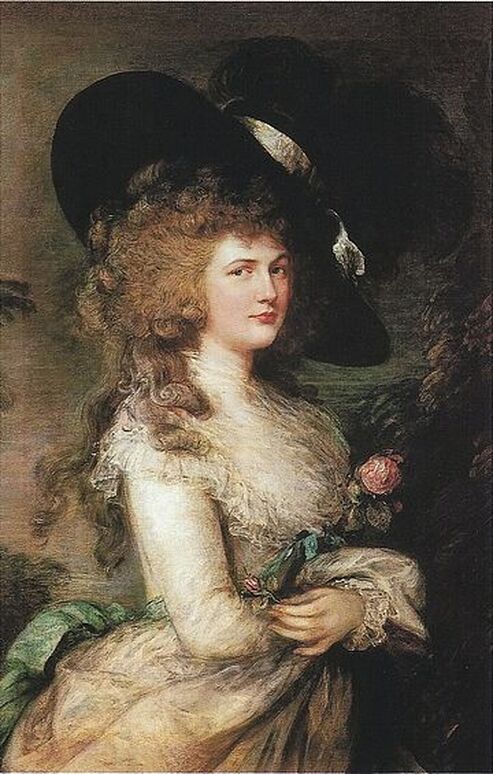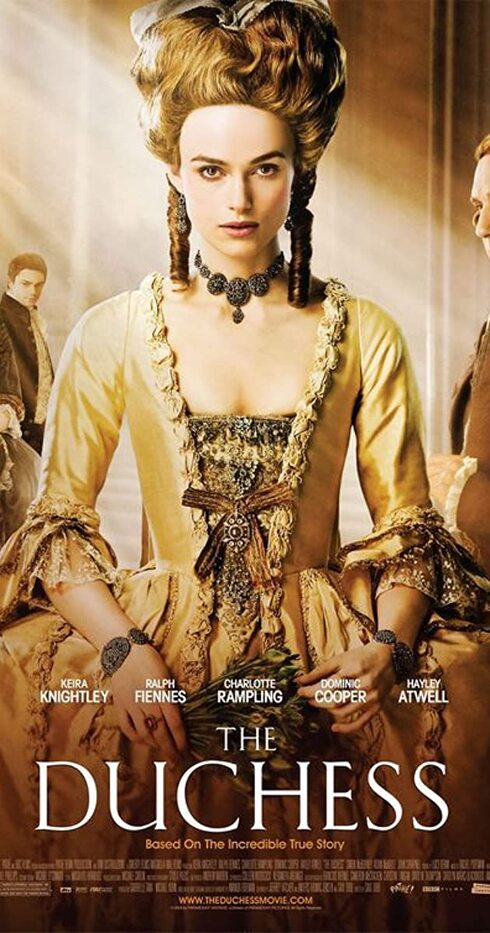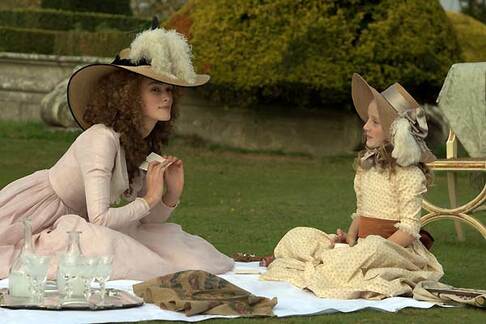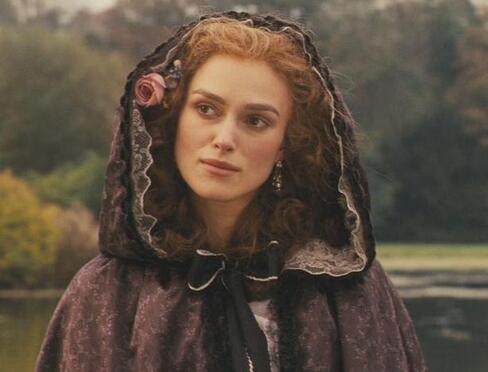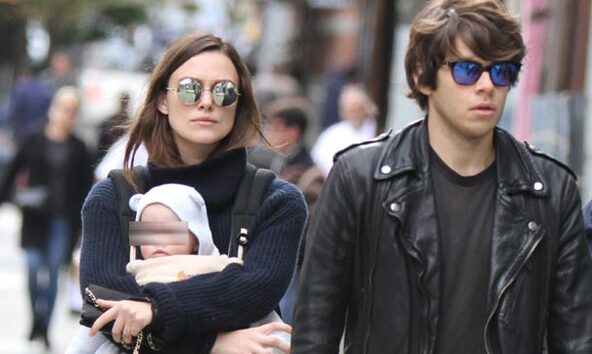|
Keira Christina Righton, OBE (born 26 March 1985) is a British actress. She has starred in both independent films and big-budget blockbusters, and is particularly noted for her roles in period dramas. Her accolades include two Empire Awards and nominations for two Academy Awards, two British Academy Film Awards, three Golden Globe Awards, one Screen Actors Guild Award and one Laurence Olivier Award. Knightley was appointed an OBE in the 2018 Birthday Honours for services to drama and charity. Born in London to actors Will Knightley and Sharman Macdonald, Knightley obtained an agent at age six, and initially worked commercials and television films. She appeared as Sabé, Padmé Amidala's handmaiden, in science fiction blockbuster Star Wars: Episode I – The Phantom Menace (1999). Despite her work, she struggled to break through until portraying a tomboy footballer in sports film Bend It Like Beckham (2001). Knightley achieved global stardom at age 18 for portraying Elizabeth Swann in fantasy swashbuckler series Pirates of the Caribbean. In the same year, she appeared in the Christmas romantic comedy Love Actually (2003) and was labelled a promising teen star. She portrayed Elizabeth Bennet in Joe Wright's adaption of Pride & Prejudice (2005), which earned Knightley her first nominations for a Golden Globe Award for Best Actress and an Academy Award for Best Actress in a Leading Role. At age 20, she became the third-youngest Best Actress nominee. Knightley starred in a series of further period pieces, portraying a complex love interest in Atonement (2007), tastemaker Georgiana Cavendish in The Duchess (2008), and the titular socialite in Anna Karenina (2012). She then forayed into contemporary dramas, appearing as an aspiring musician in Begin Again (2013) and a medical student in Jack Ryan: Shadow Recruit (2014). Knightley returned to historical films by playing cryptoanalyst Joan Clarke in The Imitation Game (2014), earning her a second round of Academy Award and BAFTA nominations, and starred as the eponymous belle époque writer in Colette (2018) to critical acclaim. On stage, Knightley has appeared in two West End productions: The Misanthrope in 2009, which earned her an Olivier Award nomination, and The Children's Hour in 2011. She also starred as the eponymous heroine in the 2015 Broadway production of Thérèse Raquin. Knightley is known for her outspoken stance on social issues, and has worked extensively with Amnesty International, Oxfam, and Comic Relief. Knightley married musician James Righton in 2013; they have two children. BiographyKeira Christina Knightley was born on 26 March 1985 in the Teddington suburb of London, to theatre actors Will Knightley and Sharman Macdonald. Her father is English and her mother is of Scottish and Welsh ancestry. She was meant to be named "Kiera", the anglicised form of "Kira", after Kira Ivanova, whom her father admired. However, her mother misspelled the name when she went to register Knightley, writing the "e" before the "i". Macdonald worked as a playwright after her career as an actress came to an end. Knightley has an older brother, Caleb.Knightley's parents encountered substantial financial difficulties after the birth of her brother. Knightley attended Teddington School. At age six, she was diagnosed with dyslexia but by the time she was 11, with her parents' support, Knightley says, "they deemed me to have got over it sufficiently." She is still a slow reader and cannot read out loud. At age three, she expressed the desire for an agent like her parents and got one at six. Knightley performed in a number of local amateur productions, which included After Juliet, written by her mother, and United States, written by her drama teacher. She focused on art, history, and English literature while studying at Esher College, but left after a year to pursue an acting career. Her mother's friends encouraged her to go to drama school, which she declined for financial and professional reasons. Since age six, Knightley began working in commercials and small television roles. Her first on-screen appearance was in the 1993 Screen One television episode titled "Royal Celebration". After appearing in a spate of television films through the mid-to-late 1990s, Knightley landed the role of Sabé, Padmé Amidala's handmaiden and decoy, in the 1999 science fiction blockbuster Star Wars: Episode I – The Phantom Menace. Her dialogue was dubbed over by Natalie Portman, who played Padmé. Knightley was cast in the role because of her close resemblance to Portman; even the two actresses' mothers had difficulty telling their daughters apart when they were in full make-up. In her first major role, the 2001 Walt Disney Productions feature film Princess of Thieves, Knightley played the daughter of Robin Hood. In preparation for the film, she trained for several weeks in archery, fencing, and horse riding. Knightley also took on the role of Lara Antipova in the 2002 miniseries adaptation of Doctor Zhivago, to positive reviews and high ratings. Despite having appeared in over a dozen film and television roles, Knightley struggled to get a breakthrough. That changed in 2002, when she starred in Gurinder Chadha's sports comedy film Bend It Like Beckham, which was a smash hit both in the UK and in the US, grossing over $76.6 million. Knightley portrayed Jules, a tomboy football player struggling against social norms who convinces her friend to pursue the sport. Knightley and her co-star Parminder Nagra attracted international attention for their performances in the film. Knightley portrayed the role of Elizabeth Swann, in the 2003 American fantasy swashbuckler film Pirates of the Caribbean: The Curse of the Black Pearl. The film, based on the Disney theme park attraction, revolves around infamous buccaneer Jack Sparrow and blacksmith Will Turner rescuing Swann, in possession of a cursed golden medallion, from 18th-century pirates. The film opened at number one on the box office, and became one of the highest-grossing releases of the year, with worldwide revenues of $654 million. Also in 2003, Knightley appeared in Richard Curtis' Christmas-themed romantic comedy Love Actually, featuring an ensemble cast, which included her childhood idol Emma Thompson. Knightley portrays Juliet, a woman whose fiancée’s best man is secretly in love with her. Knightley believes the film's trajectory to be "extraordinary", given that its popularity resurfaced a few years after the film's release. Knightley's most successful release in 2005 was Pride & Prejudice, a period drama based on Jane Austen's novel Pride and Prejudice. Knightley, who had admired the book from a young age, said of her character, "The beauty of Elizabeth is that every woman who ever reads the book seems to recognise herself, with all her faults and imperfections." On release, the film became a huge commercial success, with total collections of around US$120 million worldwide, and received positive reviews from critics. Knightley earned Best Actress in a Leading Role nominations at the Golden Globes and the Academy Awards for her performance at age 20, becoming the third-youngest nominee for the latter. Knightley's consecutive successes came with increased media scrutiny, and she later admitted to having struggled with her mental health during this period. In 2006, she reprised her role as Elizabeth Swann in the second and third productions of the Pirates of the Caribbean series. The Pirates of the Caribbean: Dead Man's Chest, released in July 2006. With the worldwide collections of $1.066 billion, it became the biggest financial hit in Knightley's career. The third instalment in the series, Pirates of the Caribbean: At World's End, was released in May, the following year. In 2008, Knightley appeared in wartime drama The Edge of Love. The film had her play the role of Vera Phillips, a childhood friend of Welsh poet Dylan Thomas and his wife Caitlin Macnamara. Knightley wrote the script with her mother, Sharman Macdonald, with Macnamara in mind. She based her performance on Marlene Dietrich. Knightley then starred as the 18th-century English aristocrat Georgiana Cavendish, Duchess of Devonshire in Saul Dibb's period drama The Duchess (2008), based on the best-selling biographical novel, Georgiana, Duchess of Devonshire by Amanda Foreman. The film tells the story of Georgiana's rise in society as a sociopolitical tastemaker after her marriage deorientates. The script Knightley was sent was covered in "huge white ostrich feathers" and a gold ribbon. Knightley was attracted to her character's strength and status as a political influence and fashion prowess, while being inwardly vulnerable and isolated. The following year, she was nominated for a British Independent Film Award for Best Actress. Knightley made her West End debut with Martin Crimp's version of Molière's comedy The Misanthrope, staged at London's Comedy Theatre in December 2009. She portrayed Jennifer, a shallow, amorous, and vulnerable American film star who is courted by an analytical and veracious playwright. Knightley chose the role as she felt that "if I don't do theatre right now, I think I'm going to start being too terrified to do it" and described the production as an "extraordinary and incredibly fulfilling" experience. In recognition of her theatre debut, Knightley was nominated for the Laurence Olivier Award for Best Actress in a Supporting Role and an Evening Standard Award. Knightley began the new decade with three films, including Never Let Me Go, an adaptation of Kazuo Ishiguro's novel of the same name. Knightley described the script as unique, one that made the reader think. Knightley played Ruth, one of three graduates of an autocratic boarding school that discovers their fates in a dystopia. Knightley starred in a 2011 revival of The Children's Hour by Lillian Hellman at the Comedy Theatre in London. She portrayed Karen Wright, an engaged schoolteacher accused of lesbianism in 1934. Knightley's only film of 2011 was David Cronenberg's historical drama A Dangerous Method. Based on writer Christopher Hampton's 2002 stage play The Talking Cure and set on the eve of World War I, the film depicts the turbulent relationships between fledgling psychiatrist Carl Jung, his mentor Sigmund Freud and Sabina Spielrein. Knightley portrayed Spielrein, the troubled but beautiful young psychoanalyst who comes between Jung and Freud. Knightley spent four months reading and discussing her character's behavior with psychologists to prepare for the role.She appre ciated the depth and variety of her character arc, which she viewed as rare for female roles. The film premiered at the 68th Venice International Film Festival to a positive reception. In 2012 Knightley reunited with director Joe Wright to film their third production, Anna Karenina, in which she starred as the title character. She said this collaboration is the most important of her career. In 2014, Knightley played against Benedict Cumberbatch in Morten Tyldum's historical drama The Imitation Game, a film based on the life of British mathematician Alan Turing(Benedict Cumberbatch). Knightley portrayed cryptanalyst and numismatist Joan Clarke, who decrypted German intelligence codes for the British government during World War II with Turing. The Imitation Game became a critical and commercial success grossing over $233.6 million. For her performance, Knightley received her second Academy Award and BAFTA Award nominations, and third Golden Globe Award nomination, all for Best Actress in a Supporting Role. In October 2015, Knightley made her Broadway debut playing the title role in Helen Edmundson's adaptation of Émile Zola's Thérèse Raquin at Studio 54. In 2018, Knightley starred in the biographical drama Colette as the titular French author. The film depicts Colette's social ascent in belle époque society through her provocative novels, but is exploited by her husband, who plagiarizes her work. The film, released at the Sundance Film Festival, was critically successful, with Knightley's performance receiving acclaim. Despite multiple successful films and award nominations, the criticism affected her, and Knightley felt that she "didn't know [her] trade." Media scrutiny decreased as her career progressed, and she spaces out her public appearances to maintain attention on her films. Beginning in the 2010s, Knightley regained confidence in her abilities, and by the release of Colette (2018), she felt she had learned her craft and mentally occupied a "good place where I feel pretty confident about what I can do". Knightley has been widely recognized for her extenstive repertoire of period dramas throughout her career and is reputed for her signature "strong female lead" parts. She has been compared to actresses Katharine Hepburn, Greta Garbo, Audrey Hepburn, and Nicole Kidman. In a 2004 BBC poll, Knightleywas named among the most influential people in British culture. She has been included several times on FHM's "100 Sexiest Women in the World" list, making her first appearance in 2004 and topping the list in 2006; she was included in every subsequent issue until 2009. She was part of the American editions of the list from 2004 to 2006, and was also placed ninth on the Maxim Hot 100 list in 2006. Knightley is the face of an Amnesty International campaign to support human rights, marking the 60th anniversary of the United Nations Universal Declaration of Human Rights. She is also involved in various other charity works. Knightley was the celebrity face for the luxury goods brands like Aspres, Shiatzy Chen, Lux haircare products, Chanel's perfume Coco Mademoiselle, and has endorsed Chanel Fine Jewellery's collection Coco Crush. In 2008, Knightley was the highest-earning British Hollywood star according to the Forbes Celebrity 100 list and was named amongst the most bankable actors in 2009. Knightley began a relationship with musician James Righton in February 2011. They were married on 4 May 2013 in Mazan, France. The couple have two daughters, Edie, born in May 2015, and Delilah, born in September 2019. The family live in Canonbury, London.
0 Comments
Leave a Reply. |
Categories
All
Archives
December 2023
|
